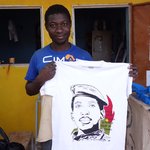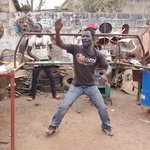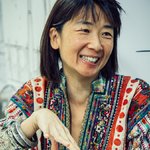Iara (pronounced "ya-ra") Lee, a Brazilian of Korean descent, is an activist, filmmaker, and the founder/director of the Cultures of Resistance Network, an organisation that promotes global solidarity and connects and supports the building of a more just and peaceful world through creative resistance and nonviolent action.
Lee started her career in the early 80’s as the producer of the São Paulo Film Festival. She then founded Caprinha Productions in New York, a mixed-media company under which she directed/produced dozens of short films and several full-length documentaries including Synthetic Pleasures (1995) and Modulations (1998), films that took a look at the worldwide history of electronic music and its impact on the world.
In 2003 she moved the Middle East to better understand and document the war in Iraq including what was happening in Syria, Yemen, Tunisia, Jordan and Lebanon. Her critically acclaimed film Cultures of Resistance (2010) draws from her experiences in the MENA region and highlights courageous acts of creative resistance in some of the world’s most dangerous places.
In 2016, Lee travelled through Burkina Faso. Through this journey, she met a remarkable cast of artists, musicians and activists who are using the country's artistic traditions to forward a message of nonviolent resistance. Her latest documentary Burkinabè Rising (2018) part of the WOMEX 18 Film Library features how the resurgent Burkinabè pursuit of peace and justice manifests itself through cultural expression, permeating every aspect of daily life.
When asked how she happened to be in Burkina Faso, Lee laughs and says, “ Everything in my life has been a bit serendipitous.“ Lee continues to work tirelessly to support projects that use resistant forces in a creative way so as to keep pushing through the mass wave of globalisation that is displacing traditions and culture as well to make the world a beautiful place for all. “I like to play with all these different elements even though I am aware that change is not overnight and that the things that I aspire towards might only materialises in three decades from now. But that does not mean I must stop contributing the little that I can” she says.
9 October 2018 - Interviewed & Written by Sana Rizvi
Sana Rizvi Iara, you have taken risk and adventure to a whole new level – you have been to almost every country where governments tell you not to go and faced situations like being on the Gaza Flotilla when it came under attack. How do you continue to make these very conscious choices to be in spaces that involve a high risk?
Iara Lee (Laughs) Yes, all the places on the US government’s red list of places not to visit, I continue to go there. I try not to think and analyse too much, because then I would probably do nothing and go nowhere. I just try to follow my intuition, gut and heart, especially when I have to go into conflict zones. Maybe I try and remain a bit clueless of the situation so I can continue doing my work.
Actually more than fear of being in these places, I am just really outraged by what is happening in these countries. I mean, people asked me about being scared when I was on the Gaza Flotilla and I say that I was never scared but I was outraged that the Israeli military was shooting at us in the middle of international waters. First thing, our satellites were turned off and they were commandos on the flotilla shooting at people and no action has been taken against them. I am just outraged. This is the world we live in and we need people to witness, document and show the world, what is really happening, especially when there is such strong government propaganda around these issues.
I must say that so far I have been very lucky and also I am very aware that I have crewmembers with me whose lives I would never want to put in jeopardy. Sometimes I think I must transition to photography so I can travel solo so as to not put others’ lives at risk.
SR You once said in an interview that your films give voice to the voiceless and space in the media to those who need it the most. Was this a conscious decision and how did you begin documenting the underrepresented?
IL I think if we allow it, everything in our lives evolves somehow organically and naturally. When I was younger, arts was the centre of the world for me but as I became more mature I realised, that we need to use arts for something beyond just arts & culture. And that’s when I had an awakening that the arts was this incredible tool for lets say social justice, environmental protection, indigenous rights, woman’s rights and ever since I’ve been on that path.
Life goes full-circle somehow. It’s funny you mention my film from the 90’s, Modulations which was mainly about music, technology and the arts yet there was even a social element that I covered in that film, which showed kids in Chicago and Detroit who didn’t have money to buy acoustic instruments. So they started playing with synthesisers and experimenting with electronic music to overcome the social circumstances they faced and a whole genre of music sprung from there. My films were somehow always showing how people use creativity to overcome their challenges. So, in a way, it’s not so much of a conscious decision but just an evolution of how I approach my craft.
SR Your latest film Burkinabè Rising focuses on not only bringing to light what is happening in Burkina Faso but also highlights how culture and art can help shape political movements. Could you elaborate on how you feel about the role that arts could play looking at your own career as a filmmaker who believes in making change on broader global issues and injustices.
IL I was very intrigued by the country Burkina Faso, so I went there to work with the organisation Slow Food International and make a film on agriculture. But when I got there, I realised everyone is an activist and felt it was such an exciting place to be. The people removed a despotic president who was ruling for 27 years just through the power of people! And then I ended up making two films Burkinabe Rising & Burkinabe Bounty.
Certain events in my life also resulted in a wake up call to use the arts, mainly film in my case, to champion important global causes and movements. I was filming with a small crew in an Afghani refugee camp in Peshawar, Pakistan. The refugees started shooting Kalashnikovs in the air and throwing stones at us. Here I was thinking that we are doing something good by reporting on what is going on in the world but the refugees told me that everyday journalist, filmmakers come to document their lives and stories but nothing has changed for them. As filmmakers, we tend to report and document on certain events and then leave the victims just the way we found them. This led to a second evolution for me where I realised just documenting human right infringements was not enough and that’s when I started the Culture of Resistance Network. We are an umbrella organisation that does a lot of hands-on walk work beyond documenting and to me that has been a very important element. It was important for me to give back to the people that I document and stay in touch with them so as to have long-term relationships with many of the different causes that we cover in our films.
SR One of the artists in the film said that you must sugar-coat (through poetry, art, humour) the hard truths to get the wider public to listen to your message. You make films on very difficult universal truths, how did you try and then keep the publics interest in the matter? What’s the formula to make a politically active film yet being able to hold a wider audience?
IL I think that just reporting on the negativity is kind of over and done with. Everyday we witness that this style of reporting is not working anymore, as people are emotionally fatigued. For me, it is more important to show that there are issues and what can we all do in our small little ways to help the issues rather than sub delegate to others. That is why I feel it’s important to engage people around me especially young people, so I’m always working with a very young crew as well since they are the ones to inherit the world and have to deal with it.
The film Burkinabe Rising depicts people who work on a very grassroots level to overthrow the despotic government and I hope it boosts the courage of other people on the path of creative resistance to keep on going rather than making people feel hopeless and defeated. Most of the time we all feel that we are too small to do something against this tsunami of oppression and injustices we see taking place in our work. So I try and inject energy into people through my films that creativity can be used in so many small ways to make a difference.
SR Why should delegates at WOMEX watch your film? What would you like your audience to take away from the film?
IL Burkinabè Rising: The Art of Resistance in Burkina Faso is a great example of the incredible power grassroots movements have when employing cultural means of resistance in order to bring awareness, empower and mobilise action. Through music, film, ecology, visual arts, architecture, the people from Burkina Faso are producing themselves, fighting obliteration and loss, challenging thus the hegemonic narrative overpowering them and legitimising the ongoing oppression. As oppressive regimes manifest themselves through various means, the most important of which being an occupation of the minds of the people, reclaiming the freedom to express oneself and one's culture becomes imperative in the struggle for freedom and justice. A small, landlocked country in West Africa, Burkina Faso remains an example of the type of political change that can be achieved when people come together, and continues to be an inspiration to the rest of the world.
article posted by:Francisco Gonçalves Silva, Piranha Arts





